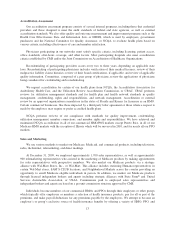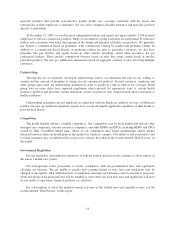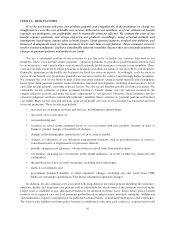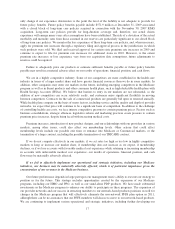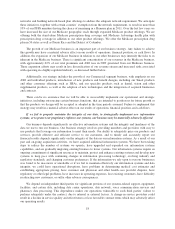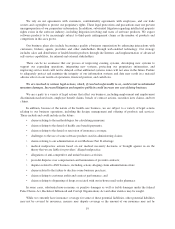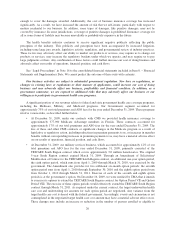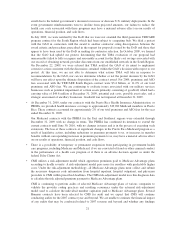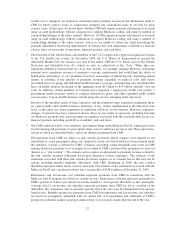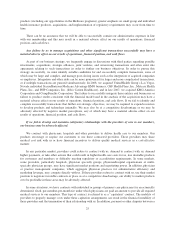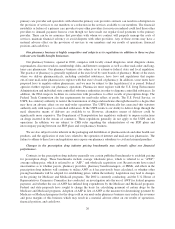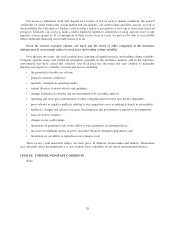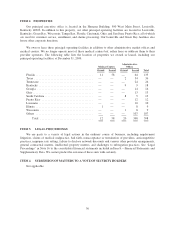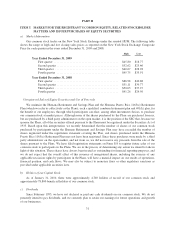Humana 2009 Annual Report Download - page 31
Download and view the complete annual report
Please find page 31 of the 2009 Humana annual report below. You can navigate through the pages in the report by either clicking on the pages listed below, or by using the keyword search tool below to find specific information within the annual report.enroll due to the federal government’s decision to increase or decrease U.S. military deployments. In the
event government reimbursements were to decline from projected amounts, our failure to reduce the
health care costs associated with these programs may have a material adverse effect on our results of
operations, financial position, and cash flows.
In July 2009, we were notified by the DoD that we were not awarded the third generation TRICARE
program contract for the South Region which had been subject to competing bids. We filed a protest
with the GAO in connection with the award to another contractor citing discrepancies between the
award criteria and procedures prescribed in the request for proposals issued by the DoD and those that
appear to have been used by the DoD in making its contractor selection. In October 2009, we learned
that the GAO had upheld our protest, determining that the TMA evaluation of our proposal had
unreasonably failed to fully recognize and reasonably account for the likely cost savings associated with
our record of obtaining network provider discounts from our established network in the South Region.
On December 22, 2009, we were advised that TMA notified the GAO of its intent to implement
corrective action consistent with the discussion contained within the GAO’s decision with respect to our
protest. At this time, we are not able to determine what actions TMA will take in response to
recommendations by the GAO, nor can we determine whether or not the protest decision by the GAO
will have any effect upon the ultimate disposition of the contract award. For 2009, premiums and ASO
fees associated with the TRICARE South Region contract were $3.4 billion, or 11.2% of our total
premiums and ASO fees. We are continuing to evaluate issues associated with our military services
businesses such as potential impairment of certain assets primarily consisting of goodwill, which had a
carrying value of $49.8 million at December 31, 2009, potential exit costs, possible asset sales, and a
strategic assessment of ancillary businesses. Goodwill was not impaired at December 31, 2009.
• At December 31, 2009, under our contracts with the Puerto Rico Health Insurance Administration, or
PRHIA, we provided health insurance coverage to approximately 349,900 Medicaid members in Puerto
Rico. These contracts accounted for approximately 2% of our total premiums and ASO fees for the year
ended December 31, 2009.
Our Medicaid contracts with the PRHIA for the East and Southeast regions were extended through
December 31, 2009 with no change in terms. The PRHIA has confirmed its intention to extend the
current contracts until June 30, 2010, with no changes in terms and is in the process of executing such
extensions. The loss of these contracts or significant changes in the Puerto Rico Medicaid program as a
result of legislative action, including reductions in premium payments to us, or increases in member
benefits without corresponding increases in premium payments to us, may have a material adverse effect
on our results of operations, financial position, and cash flows.
• There is a possibility of temporary or permanent suspension from participating in government health
care programs, including Medicare and Medicaid, if we are convicted of fraud or other criminal conduct
in the performance of a health care program or if there is an adverse decision against us under the
federal False Claims Act.
• CMS utilizes a risk-adjustment model which apportions premiums paid to Medicare Advantage plans
according to health severity. A risk-adjustment model pays more for enrollees with predictably higher
costs. Under the risk-adjustment methodology, all Medicare Advantage plans must collect and submit
the necessary diagnosis code information from hospital inpatient, hospital outpatient, and physician
providers to CMS within prescribed deadlines. The CMS risk-adjustment model uses this diagnosis data
to calculate the risk adjusted premium payment to Medicare Advantage plans.
CMS is continuing to perform audits of selected Medicare Advantage plans of various companies to
validate the provider coding practices and resulting economics under the actuarial risk-adjustment
model used to calculate the individual member capitation paid to Medicare Advantage plans. Several
Humana contracts have been selected by CMS for audit and we expect that CMS will continue
conducting audits for the 2007 contract year and beyond. We are unable to estimate the financial impact
of any audits that may be conducted related to 2007 revenue and beyond and whether any findings
21




